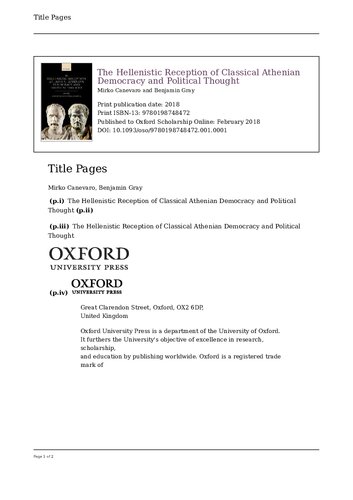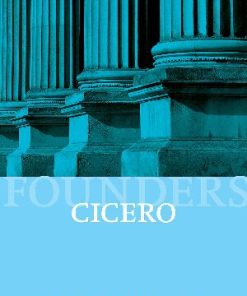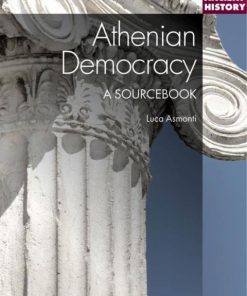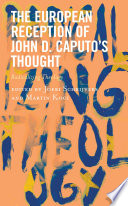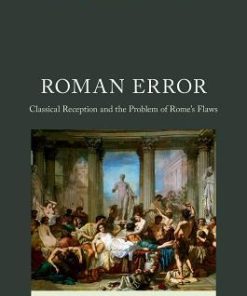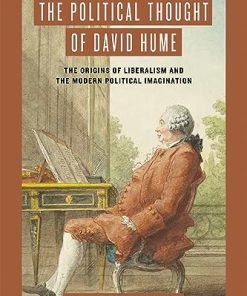The Hellenistic Reception of Classical Athenian Democracy and Political Thought Mirko Canevaro
$50.00 Original price was: $50.00.$25.00Current price is: $25.00.
The Hellenistic Reception of Classical Athenian Democracy and Political Thought – Ebook Instant Download/Delivery ISBN(s): 9780198748472,0198748477
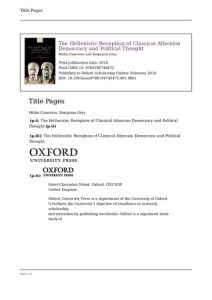
Product details:
- ISBN-10 : 0198748477
- ISBN-13 : 978-0198748472
- Author: Mirko Canevaro
In the Hellenistic period (c.323-31 BCE), Greek teachers, philosophers, historians, orators, and politicians found an essential point of reference in the democracy of Classical Athens and the political thought which it produced. However, while Athenian civic life and thought in the Classical period have been intensively studied, these aspects of the Hellenistic period have so far received much less attention. This volume seeks to bring together the two areas of research, shedding new light on these complementary parts of the history of the ancient Greek polis.
The essays collected here encompass historical, philosophical, and literary approaches to the various Hellenistic responses to and adaptations of Classical Athenian politics. They survey the complex processes through which Athenian democratic ideals of equality, freedom, and civic virtue were emphasized, challenged, blunted, or reshaped in different Hellenistic contexts and genres. They also consider the reception, in the changed political circumstances, of Classical Athenian non- and anti-democratic political thought. This makes it possible to investigate how competing Classical Athenian ideas about the value or shortcomings of democracy and civic community continued to echo through new political debates in Hellenistic cities and schools.
Table contents:
1. Introduction
Part I. Early Hellenistic Responses to Classical Athenian Democracy and Political Thought
2. Stairway to Heaven: The Politics of Memory in Early Hellenistic Athens
3. Alexander the Great and Democracy in the Hellenistic World
4. Demosthenic Influences in Early Rhetorical Education: Hellenistic Rhetores and Athenian Imagination
5. Sophists, Epicureans, and Stoics
Part II. Later Hellenistic and Early Imperial Developments in the Reception of Classical Athenian Politics
7. Polybius on ‘Classical Athenian Imperial Democracy’
8. A Later Hellenistic Debate about the Value of Classical Athenian Civic Ideals? The Evidence of Epigraphy, Historiography, and Philosophy
9. Philanthropia, Athens, and Democracy in Diodorus Siculus: The Athenian Debate
10. Getting Over Athens: Re-Writing Hellenicity in the Early Roman History of Dionysius of Halicarnassus
11. Standing up to the Demos: Plutarch, Phocion, and the Democratic Life
12. The Orator in the Theatre: The End of Athenian Democracy in Plutarch’s Phocion
13. Whatever Happened to Athens? Thoughts on the Great Convergence and Beyond
Index Locorum
General Index
People also search:
difference between hellenistic and classical greece
what are some characteristics of democracy in ancient athens
the hellenistic reception of classical athenian democracy and political thought
what was a feature of athenian democracy
by the classical era greek religion
by the fourth century b.c.e. greek plays
You may also like…
Politics & Philosophy - Government & Politics
Politics & Philosophy - Government & Politics
Democracy and the Cartelization of Political Parties 1st Edition
Politics & Philosophy - Anthropology
Politics
Politics & Philosophy - Politics
Politics & Philosophy - European & American Philosophy
History Society
Time, History, and Political Thought 1st edition by John Robertson 1009289365 978-1009289368


